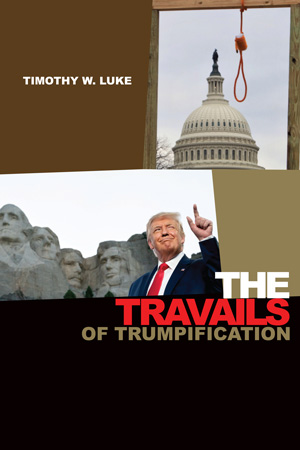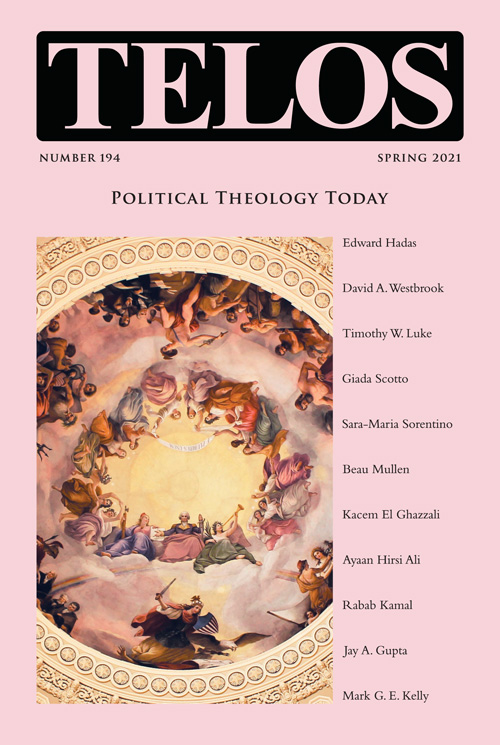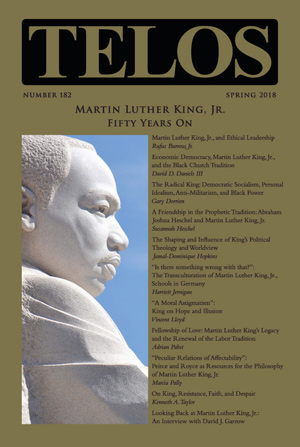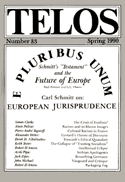By David Pan · Monday, August 29, 2022 Save 20% on the paperback edition of The Travails of Trumpification by purchasing it in our online store and using the coupon code BOOKS20 during checkout.
 The disagreement about the propriety of the FBI’s search of Donald Trump’s residence reveals a fundamental divide over the proper role of the federal government. On the one hand, the defenders of the search have emphasized the rule of law and the idea that no one should stand above the law. From this perspective, Trump represents a danger to democracy itself, which the federal government is defending. On the other hand, for Trump supporters the search epitomizes the all-encompassing reach of the federal government into people’s daily lives and thus a further example of the erosion of freedom in the United States. The uncomprehending attitude of each side toward the other exemplifies the ways in which “the travails of Trumpification,” as described by Tim Luke, do not represent a passing phenomenon. As three recent reviews of Luke’s book emphasize, Trumpism is a complex phenomenon that is not just about Donald Trump. Populism predates Trump’s rise by more than a century, and the motivating attitudes and ideas will surely continue to shape American politics after he is gone. The focus on Trump the man has led, for both supporters (not least Trump himself) and detractors, to a failure to address the broader currents that he has been able to mobilize. The disagreement about the propriety of the FBI’s search of Donald Trump’s residence reveals a fundamental divide over the proper role of the federal government. On the one hand, the defenders of the search have emphasized the rule of law and the idea that no one should stand above the law. From this perspective, Trump represents a danger to democracy itself, which the federal government is defending. On the other hand, for Trump supporters the search epitomizes the all-encompassing reach of the federal government into people’s daily lives and thus a further example of the erosion of freedom in the United States. The uncomprehending attitude of each side toward the other exemplifies the ways in which “the travails of Trumpification,” as described by Tim Luke, do not represent a passing phenomenon. As three recent reviews of Luke’s book emphasize, Trumpism is a complex phenomenon that is not just about Donald Trump. Populism predates Trump’s rise by more than a century, and the motivating attitudes and ideas will surely continue to shape American politics after he is gone. The focus on Trump the man has led, for both supporters (not least Trump himself) and detractors, to a failure to address the broader currents that he has been able to mobilize.
Continue reading →
By David Pan · Monday, August 8, 2022 Dear Telos readers,
I’m excited to invite you to attend a special event at the John D. Calandra Italian American Institute in New York City on October 14–15, 2022, to celebrate the 200th issue of Telos, which will be appearing in Fall 2022. You can register for the event at the Telos-Paul Piccone Institute website, at www.telosinstitute.net/telos200. The event will take place from 3 pm to 6 pm on October 14 and from 9 am to 5 pm on October 15. The admission is $100 for both days and includes a reception on October 14 and lunch on October 15.
The event will feature Joel Kotkin (author of The New Class Conflict) and Michael Lind (author of The New Class War: Saving Democracy from the Managerial Elite) as keynote speakers, who will discuss the new politics of class.
Continue reading →
By David Pan · Friday, March 19, 2021 Telos 194 (Spring 2021): Political Theology Today is now available for purchase in our store. Individual subscriptions to Telos are also available in both print and online formats.
 What does political theology mean today? At the Telos-Paul Piccone Institute conference from which many of the essays in this issue originated, a primary goal was to discuss the crisis of secular liberalism and “how faith is reshaping culture and politics today.” But even this project perhaps limits too much the scope of political theology, implying that we have a choice between reason and faith, or that political theology is a commitment to faith rather than an analysis of the element of faith that underlies all of our endeavors. The idea of political theology begins with the premise that every existing human order is built upon some understanding of ultimate meaning. The task would then be to analyze the kind of meaning that each existing order embodies and determine the kinds of decisions about meaning that are made and need to be made at various points in its history. Even secular liberalism, to the extent that it constitutes an existing order, presumes some answer to this question of meaning, and a closer look at the political theology of the United States reveals a mythic dimension that underlies its liberal democratic processes. The essays in this issue examine the political theological underpinnings of economy, politics, technology, and religion, laying out the ways in which these areas of human life develop not as autonomous spheres but as the result of struggles over a set of political theological choices. What does political theology mean today? At the Telos-Paul Piccone Institute conference from which many of the essays in this issue originated, a primary goal was to discuss the crisis of secular liberalism and “how faith is reshaping culture and politics today.” But even this project perhaps limits too much the scope of political theology, implying that we have a choice between reason and faith, or that political theology is a commitment to faith rather than an analysis of the element of faith that underlies all of our endeavors. The idea of political theology begins with the premise that every existing human order is built upon some understanding of ultimate meaning. The task would then be to analyze the kind of meaning that each existing order embodies and determine the kinds of decisions about meaning that are made and need to be made at various points in its history. Even secular liberalism, to the extent that it constitutes an existing order, presumes some answer to this question of meaning, and a closer look at the political theology of the United States reveals a mythic dimension that underlies its liberal democratic processes. The essays in this issue examine the political theological underpinnings of economy, politics, technology, and religion, laying out the ways in which these areas of human life develop not as autonomous spheres but as the result of struggles over a set of political theological choices.
Continue reading →
By Telos Press · Monday, January 18, 2021 Save 30% on Telos 182 (Spring 2018): Martin Luther King, Jr.: Fifty Years On, a special issue dedicated to King’s life and thought, in our store. Offer expires 1/24/21.
 In commemoration of the life and legacy of Martin Luther King, Jr., today’s episode of the Telos Press Podcast features a wide-ranging interview with Kenneth D. Johnson by Telos editor David Pan. Their discussion covers a variety of topics, including the influence of King on the Black Lives Matter movement, the different approaches to political activism and civil disobedience, the call to defund the police, the nature and effects of systemic racism, the role of education in expanding opportunities for the Black community, the role of government in addressing social and economic inequalities, and the question of how a universal basic income might help alleviate these problems. In commemoration of the life and legacy of Martin Luther King, Jr., today’s episode of the Telos Press Podcast features a wide-ranging interview with Kenneth D. Johnson by Telos editor David Pan. Their discussion covers a variety of topics, including the influence of King on the Black Lives Matter movement, the different approaches to political activism and civil disobedience, the call to defund the police, the nature and effects of systemic racism, the role of education in expanding opportunities for the Black community, the role of government in addressing social and economic inequalities, and the question of how a universal basic income might help alleviate these problems.
In addition to being a member of Telos‘s editorial board, Ken Johnson edited Telos 182 (Spring 2018): Martin Luther King, Jr.: Fifty Years On, a special issue dedicated to King’s life and thought. We are now offering a 30% discount on Telos 182 when you purchase your copy in our store. With ten in-depth articles on King’s intellectual and political legacy, as well as an interview with King scholar David Garrow, Telos 182 is a must-read for anyone interested in understanding how Martin Luther King Jr. continues to influence us today. Read the introduction to Telos 182 here.
Listen to the podcast here.
Continue reading →
By Andreas Pantazopoulos · Monday, July 6, 2020 The following essay was originally published in French as “La Grèce et la pandémie: Quelques réflexions,” in Revue Politique, June 30, 2020, and appears here by permission. Translated by Russell A. Berman.
 It is widely recognized that Greece survived the difficult test of COVID-19 well. The international press has been writing about the “little Greek miracle” for more than a month: a country ravaged by the economic crisis of the past years has been able to resist the public health challenge better than many other European countries. And it is right to emphasize this unexpected success as due primarily to the speed of the government’s decisions, the closing of the borders, the strict lockdown of about two months, but also the population’s obedience to special laws issued by the authorities, both in terms of health and politics. Every evening at 6:00 PM, the epidemiologist Professor Sotirios Tsiodras spoke to the public directly on television about the measures taken and the track of the pandemic, in a calm, humane, and confident tone, showing appropriate emotions when he spoke of the deaths, turning into the family doctor, a personality familiar to everyone. It is widely recognized that Greece survived the difficult test of COVID-19 well. The international press has been writing about the “little Greek miracle” for more than a month: a country ravaged by the economic crisis of the past years has been able to resist the public health challenge better than many other European countries. And it is right to emphasize this unexpected success as due primarily to the speed of the government’s decisions, the closing of the borders, the strict lockdown of about two months, but also the population’s obedience to special laws issued by the authorities, both in terms of health and politics. Every evening at 6:00 PM, the epidemiologist Professor Sotirios Tsiodras spoke to the public directly on television about the measures taken and the track of the pandemic, in a calm, humane, and confident tone, showing appropriate emotions when he spoke of the deaths, turning into the family doctor, a personality familiar to everyone.
Continue reading →
By Johanna K. Schenner · Thursday, October 31, 2013 As an occasional feature on TELOSscope, we highlight a past Telos article whose critical insights continue to illuminate our thinking and challenge our assumptions. Today, Johanna Schenner looks at Simon Clarke’s “The Crisis of Fordism or the Crisis of Social Democracy?” from Telos 83 (Spring 1990).
 Simon Clarke’s “The Crisis of Fordism or the Crisis of Social Democracy?” deals with the need to develop different economic strategies as the interventionist welfare state underwent many challenges and crises in the 1980s. The crumbling of communism further supported the idea that weak state interventionism often could not reach its stipulated economic goals. In comparison to the socialist critique of the state, the political right put forward measures and tools such as privatization to support its critique of the state by the following means: first, by focusing on the selective redistribution of income; and second, by bringing about a particular kind of Keynesian economic policy featuring military characteristics (73). The economic growth came to an end in 1987 when a global panic about the massive credit boom begun under Reagan and Thatcher broke wide open. Still, the right’s policies reached a new height with the waves of radical liberalization in the former communist countries as well as in the Third World. Clarke, however, expresses severe doubts about this strategy being the solution to neoliberalism’s economic strategy crisis (79). Simon Clarke’s “The Crisis of Fordism or the Crisis of Social Democracy?” deals with the need to develop different economic strategies as the interventionist welfare state underwent many challenges and crises in the 1980s. The crumbling of communism further supported the idea that weak state interventionism often could not reach its stipulated economic goals. In comparison to the socialist critique of the state, the political right put forward measures and tools such as privatization to support its critique of the state by the following means: first, by focusing on the selective redistribution of income; and second, by bringing about a particular kind of Keynesian economic policy featuring military characteristics (73). The economic growth came to an end in 1987 when a global panic about the massive credit boom begun under Reagan and Thatcher broke wide open. Still, the right’s policies reached a new height with the waves of radical liberalization in the former communist countries as well as in the Third World. Clarke, however, expresses severe doubts about this strategy being the solution to neoliberalism’s economic strategy crisis (79).
Continue reading →
|
|
 The disagreement about the propriety of the FBI’s search of Donald Trump’s residence reveals a fundamental divide over the proper role of the federal government. On the one hand, the defenders of the search have emphasized the rule of law and the idea that no one should stand above the law. From this perspective, Trump represents a danger to democracy itself, which the federal government is defending. On the other hand, for Trump supporters the search epitomizes the all-encompassing reach of the federal government into people’s daily lives and thus a further example of the erosion of freedom in the United States. The uncomprehending attitude of each side toward the other exemplifies the ways in which “the travails of Trumpification,” as described by Tim Luke, do not represent a passing phenomenon. As three recent reviews of Luke’s book emphasize, Trumpism is a complex phenomenon that is not just about Donald Trump. Populism predates Trump’s rise by more than a century, and the motivating attitudes and ideas will surely continue to shape American politics after he is gone. The focus on Trump the man has led, for both supporters (not least Trump himself) and detractors, to a failure to address the broader currents that he has been able to mobilize.
The disagreement about the propriety of the FBI’s search of Donald Trump’s residence reveals a fundamental divide over the proper role of the federal government. On the one hand, the defenders of the search have emphasized the rule of law and the idea that no one should stand above the law. From this perspective, Trump represents a danger to democracy itself, which the federal government is defending. On the other hand, for Trump supporters the search epitomizes the all-encompassing reach of the federal government into people’s daily lives and thus a further example of the erosion of freedom in the United States. The uncomprehending attitude of each side toward the other exemplifies the ways in which “the travails of Trumpification,” as described by Tim Luke, do not represent a passing phenomenon. As three recent reviews of Luke’s book emphasize, Trumpism is a complex phenomenon that is not just about Donald Trump. Populism predates Trump’s rise by more than a century, and the motivating attitudes and ideas will surely continue to shape American politics after he is gone. The focus on Trump the man has led, for both supporters (not least Trump himself) and detractors, to a failure to address the broader currents that he has been able to mobilize.

 It is widely recognized that Greece survived the difficult test of COVID-19 well. The international press has been writing about the “little Greek miracle” for more than a month: a country ravaged by the economic crisis of the past years has been able to resist the public health challenge better than many other European countries. And it is right to emphasize this unexpected success as due primarily to the speed of the government’s decisions, the closing of the borders, the strict lockdown of about two months, but also the population’s obedience to special laws issued by the authorities, both in terms of health and politics. Every evening at 6:00 PM, the epidemiologist Professor Sotirios Tsiodras spoke to the public directly on television about the measures taken and the track of the pandemic, in a calm, humane, and confident tone, showing appropriate emotions when he spoke of the deaths, turning into the family doctor, a personality familiar to everyone.
It is widely recognized that Greece survived the difficult test of COVID-19 well. The international press has been writing about the “little Greek miracle” for more than a month: a country ravaged by the economic crisis of the past years has been able to resist the public health challenge better than many other European countries. And it is right to emphasize this unexpected success as due primarily to the speed of the government’s decisions, the closing of the borders, the strict lockdown of about two months, but also the population’s obedience to special laws issued by the authorities, both in terms of health and politics. Every evening at 6:00 PM, the epidemiologist Professor Sotirios Tsiodras spoke to the public directly on television about the measures taken and the track of the pandemic, in a calm, humane, and confident tone, showing appropriate emotions when he spoke of the deaths, turning into the family doctor, a personality familiar to everyone.  Simon Clarke’s “The Crisis of Fordism or the Crisis of Social Democracy?” deals with the need to develop different economic strategies as the interventionist welfare state underwent many challenges and crises in the 1980s. The crumbling of communism further supported the idea that weak state interventionism often could not reach its stipulated economic goals. In comparison to the socialist critique of the state, the political right put forward measures and tools such as privatization to support its critique of the state by the following means: first, by focusing on the selective redistribution of income; and second, by bringing about a particular kind of Keynesian economic policy featuring military characteristics (73). The economic growth came to an end in 1987 when a global panic about the massive credit boom begun under Reagan and Thatcher broke wide open. Still, the right’s policies reached a new height with the waves of radical liberalization in the former communist countries as well as in the Third World. Clarke, however, expresses severe doubts about this strategy being the solution to neoliberalism’s economic strategy crisis (79).
Simon Clarke’s “The Crisis of Fordism or the Crisis of Social Democracy?” deals with the need to develop different economic strategies as the interventionist welfare state underwent many challenges and crises in the 1980s. The crumbling of communism further supported the idea that weak state interventionism often could not reach its stipulated economic goals. In comparison to the socialist critique of the state, the political right put forward measures and tools such as privatization to support its critique of the state by the following means: first, by focusing on the selective redistribution of income; and second, by bringing about a particular kind of Keynesian economic policy featuring military characteristics (73). The economic growth came to an end in 1987 when a global panic about the massive credit boom begun under Reagan and Thatcher broke wide open. Still, the right’s policies reached a new height with the waves of radical liberalization in the former communist countries as well as in the Third World. Clarke, however, expresses severe doubts about this strategy being the solution to neoliberalism’s economic strategy crisis (79). 






